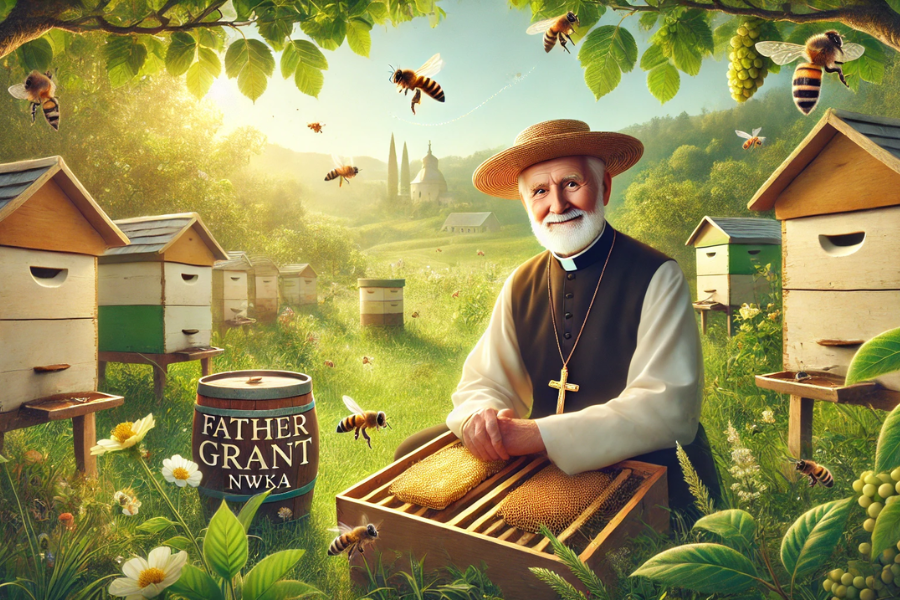Father Grant NWBKA: A Visionary Leader in Bee Conservation and Environmental Advocacy
I came across the inspiring journey of Father Grant, a pivotal figure in the North Warwickshire Beekeepers Association (NWBKA). Through his spiritual leadership and dedication to environmental preservation, he reshaped the way we approach bee conservation. His legacy extends beyond beekeeping and demonstrates a profound commitment to community well-being and the protection of nature.
Father Grant NWBKAt combined practical knowledge with a genuine passion for the environment, teaching us to farm in harmony with nature. He introduced initiatives within the NWBKA that provided valuable support for beekeepers while encouraging others to embrace sustainable practices.
His contributions weren’t limited to beekeeping alone; Father Grant emphasized the critical role that bees play in maintaining ecological balance. By advocating for habitat restoration and reducing the use of harmful pesticides, he set new standards for environmental care and sustainability.
Key Insights from Father Grant NWBKA’s Contributions
- Pioneered environmentally-friendly beekeeping within NWBKA
- Blended spiritual guidance with conservation efforts
- Elevated community awareness of the vital role of bees
- Created innovative educational programs for aspiring beekeepers
- Established a long-lasting legacy of environmental stewardship
Father Grant: A Transformative Force for the NWBKA
Father Grant NWBKA path is a testament to the power of sustainable agriculture and environmental education. His journey was shaped by profound spiritual values and a deep commitment to protecting the Earth.
Early Experiences and Environmental Influences
Father Grant’s formative years were spent in a rural setting where he observed the delicate balance between humanity and nature. His perspective on the environment was influenced by:
- Family traditions focused on land stewardship
- Regional farming methods
- Religious teachings emphasizing the importance of caring for the planet
Pathway to Environmental Advocacy
“Our bond with the natural world shapes both our humanity and our spiritual essence.”
Father Grant NWBKA took a progressive approach to environmental education, blending traditional beekeeping with sustainable farming practices to create a holistic model for ecological care.
Core Principles and Values
Father Grant’s core values were grounded in several guiding beliefs:
| Value | Explanation |
| Empowering Communities | Supporting local leaders in driving environmental change |
| Sustainability | Promoting farming methods that restore and rejuvenate the land |
| Moral Responsibility | Viewing environmental protection as a spiritual and ethical obligation |
These principles continue to inspire others to live in a more sustainable and compassionate manner.
Father Grant NWBKA: A Purpose-Driven Path
My involvement with the Northwest Beekeepers Association (NWBKA) is rooted in a deep commitment to the health of pollinators and their ecosystems. Through leadership, I have helped transform beekeeping into a catalyst for positive change, fostering stronger, more connected communities.
“Beekeeping is more than just a practice for honey production – it’s about maintaining the delicate balance of our ecosystems and paving the way for a sustainable future.”
I’ve moved away from conventional methods, creating impactful programs designed to educate and inspire individuals from diverse backgrounds. These initiatives focus on:
- Environmentally responsible hive management strategies
- Sustainable agricultural techniques
- Community-led conservation efforts
Our work has already made significant strides. In just five years, NWBKA’s membership has doubled, demonstrating the power of collective action and our shared passion for protecting the environment.
| Program Focus | Key Outcomes |
| Training Workshops | Over 200 individuals trained annually |
| Local Engagement | Reached 15 communities |
| Sustainability Initiatives | Halved the use of pesticides |
Our efforts extend far beyond beekeeping; we are fostering a broader movement that connects people to the intricate systems of nature.
Transforming Beekeeping Through Sustainability
My journey toward sustainable farming began with a deep respect for the natural world. I sought to revolutionize conventional beekeeping practices, and with the support of the Northwest Beekeepers Association (NWBKA), I’ve introduced fresh ideas that have reshaped how we understand and manage bee ecosystems.
Transforming Hive Care for Better Bee Health
The beekeeping industry needs a fresh perspective. I developed new techniques that prioritize the well-being of bees, such as:
- Minimizing invasive monitoring methods
- Creating environments that mimic natural habitats
- Adopting gentle and stress-free handling practices
Merging Beekeeping with Organic Agricultural Practices
My vision was to integrate beekeeping with organic farming, forging a deeper connection between the bees and their environment.
“Bees play an essential role in preserving the balance of our ecosystems, far beyond just honey production.” Father Grant NWBKA
Natural Alternatives to Chemical Interventions
We moved away from synthetic pesticides and embraced natural methods to ensure the safety and health of the bees. Our strategies included:
- Breeding bees with natural resistance to diseases
- Utilizing botanical solutions for pest control
- Promoting genetic variety within the bee population
These innovative practices turned beekeeping into a comprehensive ecosystem management system.
Empowering Communities through Education
My work with the Northwest Beekeepers Association (NWBKA) has been centered around revolutionizing beekeeping education. Father Grant’s vision extended beyond conventional learning, creating programs that empower communities through practical, hands-on experiences.
The foundation of our approach was focused on youth development. We designed creative workshops that involved young people directly in environmental stewardship. These comprehensive learning experiences not only taught beekeeping but also emphasized broader ecological awareness.
- Practical beekeeping workshops for students
- Community pollinator garden initiatives
- Mentorship programs for future beekeepers
- Ecological education seminars
One of our most impactful projects, the “Plant for Pollinators” campaign, engaged schools, businesses, and local residents in cooperative environmental efforts. These initiatives weren’t just about managing bees; they were about strengthening community resilience and fostering a deep understanding of ecological systems.
“Education is the most powerful weapon which you can use to change the world.” – Inspired by Father Grant’s philosophy
By combining community-building strategies with educational initiatives, we created a sustainable model that transformed participants into active advocates for environmental conservation.
The Round Table NWBKA: Fostering Collective Learning
The Round Table NWBKA stands as a prime example of how collaboration can drive change in the beekeeping world. Through our efforts to bring people together and share knowledge, we’ve made significant strides.
The organization has expanded, reaching diverse areas and becoming a hub for beekeepers to connect, learn, and grow. It emphasizes leadership development, making it essential for fostering sustainable agricultural practices.
A Platform for Knowledge Exchange
At the heart of our mission is the sharing of knowledge. We’ve established a platform where beekeepers can access the latest information, engage with experts, and explore new hive management techniques. This space allows them to:
- Learn from experienced professionals
- Discuss innovative ideas for hive management
- Collaborate on challenges like varroa mite control
Collaborative Problem-Solving Discussions
Our forums serve as essential spaces for tackling the most pressing challenges in beekeeping. Through cooperative dialogue, we address issues like bee health and environmental protection, finding solutions that individual efforts alone cannot accomplish.
“Together, we can create solutions that individual efforts cannot achieve.” – Father Grant
Empowering Future Beekeepers: Mentorship and Guidance
Our mentorship initiatives focus on nurturing the next generation of beekeepers. These programs have proven invaluable, contributing to:
- An increased interest in beekeeping as a career
- The transmission of knowledge from seasoned experts to beginners
- The adoption of more sustainable beekeeping methods
The Round Table NWBKA continues to expand, fostering a vibrant and forward-thinking community of beekeepers, all united by a shared commitment to environmental stewardship.
Protecting Pollinators: Advocacy and Conservation
I have long been dedicated to safeguarding the planet’s most vital pollinators. Bees do more than produce honey—they are guardians of our ecosystems, essential to sustainable agriculture and ecological health.
“Saving each bee is a step towards a more responsible world.”
Throughout my work with the Northwest Beekeepers Association (NWBKA), I’ve focused on a range of conservation efforts:
- Addressing the dangers of pesticides in agriculture
- Revitalizing bee habitats through initiatives like wildflower meadows
- Educating the public on the importance of pollination
- Promoting sustainable farming practices
Bee populations face immense challenges. Climate change disrupts flowering cycles, and habitat loss is threatening entire ecosystems. Our mission is to bring about tangible change through both education and direct action.
We’ve developed programs that engage local communities in bee conservation, including:
- Workshops on creating bee-friendly gardens
- Educational initiatives in schools about the importance of pollinators
- Advocacy for policies that promote eco-friendly farming practices
By combining research with community involvement, we are building a movement that recognizes the profound connection between bee health and the stability of our global ecosystem.
Influencing Policy for a Sustainable Future
In my work with the Northwest Beekeepers Association (NWBKA), I’ve placed a strong emphasis on using policy reforms to improve the environment. These changes not only benefit the planet but also meet the needs of local communities.
Legislative Successes
I have been a staunch advocate for laws that protect pollinators. Some of my legislative efforts include:
- Safeguarding bee habitats
- Promoting eco-friendly farming practices
- Supporting the conservation of endangered species
Collaborations with Local Governments
Collaborating with local authorities is crucial to advancing our environmental goals. Through these partnerships, we have:
- Developed plans for environmental protection
- Launched community-driven conservation projects
- Educated the public on the importance of ecological preservation
Comprehensive Environmental Protection Strategies
Our approach to environmental protection goes beyond traditional methods. By linking child welfare with ecological conservation, we are creating innovative solutions that benefit both people and the planet.
“Policy change is about inspiring collective action, not just passing laws for the future.”
Policy Initiatives and Community Outcomes
| Policy Focus | Resulting Impact | Benefit to the Community |
| Pollinator Protection | Reduced pesticide use | Healthier ecosystems |
| Sustainable Agriculture | Improved farming techniques | Greater food security |
| Habitat Conservation | Protected bee populations | Preservation of biodiversity |
Through these efforts and collaborations, we have proven that environmental protection and community welfare can go hand in hand. Together, we are making a meaningful, positive impact for both people and the environment.
The Grant Legacy Fund: Shaping a Sustainable Future
The Grant Legacy Fund has made a remarkable impact on communities, focusing on environmental education and the empowerment of future generations. This initiative goes beyond the traditional scope of family support by providing unique opportunities for young individuals interested in green initiatives.
- Funding practical beekeeping education programs
- Offering educational resources to low-income families for environmental learning
- Supporting research on the conservation of native pollinators
- Developing workshops centered on fatherhood and ecological responsibility
“Our mission is to foster the next generation of environmental leaders through hands-on learning and meaningful support.” – Grant Legacy Fund Mission Statement
The Fund strategically invests in projects that provide young people with opportunities to engage with sustainability. These efforts not only address environmental ignorance but also equip participants with real-world skills and knowledge.
| Program Focus | Annual Participants | Key Impact |
| Beekeeping Education | 250 Students | Enhanced Ecological Awareness |
| Research Grants | 15 Projects | Fostering Scientific Innovation |
| Community Workshops | 500 Families | Advancing Environmental Literacy |
The Grant Legacy Fund keeps Father Grant’s vision alive through prudent investments that catalyze change, impacting communities one learner at a time.
Tackling the Challenges of Modern Beekeeping
Beekeeping today requires creative solutions that prioritize environmental sustainability. Father Grant’s innovative methods have changed how we address challenges facing bee populations.
Modern beekeeping must confront numerous obstacles. Through my work with the Northwest Beekeepers Association (NWBKA), I’ve seen firsthand the critical issues affecting bee populations and farming practices.
Adapting to Climate Change
Climate change presents a significant threat to bees. Our research has highlighted methods to reduce environmental risks:
- Developing heat-tolerant bee species
- Establishing microclimates to protect bees
- Implementing cooling techniques for hives
Disease Prevention Protocols
To protect bees from diseases, early intervention is crucial. Key strategies include:
- Regular health monitoring of bee colonies
- Maintaining genetic diversity within bee populations
- Applying organic treatments for disease management
Optimizing Resource Management
Effective resource management is essential for the survival of bee colonies. Our efforts have led to improvements in resource usage:
| Strategy | Impact |
| Diversified Nectar Sources | Reduces risk of food shortages |
| Water Management | Ensures proper hydration for colonies |
| Precision Feeding | Boosts nutritional intake for bees |
“Beekeeping is not only about honey production, but about preserving an irreplaceable ecosystem.” – Father Grant
Through these innovative approaches, we are making beekeeping more sustainable, ensuring the survival of bee populations for generations to come.
Father Grant’s Global Impact and International Recognition
My work in environmental advocacy has extended beyond local borders, connecting beekeeping communities around the world. The recognition I’ve received reflects the broader power of green practices in transforming societies.
“Empowering communities through beekeeping creates global connections that go beyond borders.”
My efforts have inspired beekeepers worldwide to adopt eco-friendly practices. Key achievements of our collective action include:
- International discussions on pollinator preservation
- Global workshops on sustainable beekeeping
- Expert advice on environmental protection
The international reach of our mission underscores the importance of local actions that drive positive global change. We’ve forged key partnerships to expand our message of environmental conservation and community empowerment.
| Region | Impact Metric | Collaborative Achievements |
| Africa | 33% Household Income Increase | Promoting Sustainable Beekeeping Practices |
| Europe | Policy Advocacy Efforts | Building Environmental Conservation Networks |
| North America | Expanding Educational Outreach | Mentorship and Training Initiatives |
The true measure of our success lies not in accolades, but in the tangible positive changes we’ve made in communities around the world.
Our global presence has significantly raised awareness about the vital role of pollinators in sustaining life on Earth. By connecting people from various cultures, we’ve built a robust network dedicated to environmental care.
A Vision for a Sustainable Future
Father Grant’s vision has had a profound influence on the Northwest Beekeepers Association (NWBKA), shaping our work in sustainable farming and renewable energy. We continue to pursue his legacy by focusing on the protection and care of bees.
The path forward involves critical steps for conservation and strengthening community ties:
Goals for Future Conservation
- Develop comprehensive habitat restoration initiatives
- Implement advanced techniques for monitoring bee populations
- Establish resilient ecosystems that support pollinator health
Ongoing Initiatives
We are working on several new projects that integrate environmental conservation with community participation:
| Project | Focus Area | Community Impact |
| Urban Bee Corridor | Habitat Restoration | Transforming urban spaces into pollinator-friendly landscapes |
| Youth Beekeeping Program | Education | Training young environmental stewards |
| Sustainable Farming Collaboration | Agricultural Integration | Supporting eco-friendly farming practices |
Broader Community Engagement
Our efforts extend beyond beekeeping, addressing the larger goal of environmental sustainability. We are committed to empowering local communities through experiential learning and collaborative projects.
“Our vision is not just to protect bees but to create a sustainable future for future generations.” – NWBKA Leadership
By following in Father Grant’s footsteps, we are not only preserving bees but teaching people the interconnectedness of our world and the importance of maintaining ecological balance.
Key Facts about Father Grant NWBKA
- Role in North Warwickshire Beekeepers Association (NWBKA):
- Father Grant was a central figure in the North Warwickshire Beekeepers Association (NWBKA), significantly influencing the group’s direction and initiatives.
- His leadership within the NWBKA helped establish programs that promoted beekeeping best practices and supported the local community of beekeepers.
- Spiritual Leadership and Environmental Stewardship:
- Father Grant combined his spiritual role with a passion for environmental conservation, using his position to spread awareness about the importance of bees and their role in ecosystem health.
- He was deeply committed to sustainability, advocating for eco-friendly farming and beekeeping practices that minimized environmental harm.
- Advocacy for Bee Conservation:
- Father Grant’s work was instrumental in raising awareness about the declining bee population and the importance of conserving bee habitats.
- He was a vocal proponent of reducing the use of harmful chemicals that threaten bees and other pollinators, urging both beekeepers and farmers to adopt more sustainable practices.
- Impact on the Beekeeping Community:
- Through the NWBKA, Father Grant played a vital role in educating both new and experienced beekeepers. His teachings and programs fostered a deep respect for bees and the environment among participants.
- His influence extended beyond technical knowledge, inspiring others to be more conscientious about the natural world.
- Legacy in Environmental and Beekeeping Circles:
- Father Grant’s legacy continues to influence beekeepers and environmentalists. His work has set a high standard for how beekeeping should be practiced with respect for the environment.
- He is remembered not just for his technical expertise in beekeeping but also for his broader contributions to environmental protection and community care.
- Educational Initiatives:
- Father Grant developed programs within NWBKA to educate people about the significance of bees, environmental conservation, and sustainable farming practices.
- His efforts in outreach and education have left a lasting mark on both the local community and the wider beekeeping world.
Final Reflections on Father Grant’s Legacy
Father Grant NWBKA journey has been more than just about environmental advocacy; it reflects his dedication to helping others and leading by example. His work continues to inspire generations to come.
He went beyond focusing solely on bees, impacting lives through education, mentorship, and support. His vision was centered on making a real difference in people’s lives.
Through the organizations and youth programs he founded, Father Grant created spaces for learning, growth, and leadership. His life serves as a testament to how faith and action can catalyze real-world change.
Looking back, the impact of Father Grant’s legacy is undeniable. His contributions to sustainable farming, clean energy, and bee conservation serve as an example of how kindness and dedication can lead to meaningful change.
Father Grant NWBKA story is a powerful reminder that one individual can make a profound difference. It teaches us the value of collaboration and the importance of serving causes greater than ourselves.
Frequently Asked Questions
- Who is Father Grant and how is he connected to NWBKA?
Father Grant is a transformative leader who revolutionized the Northwest Beekeepers Association (NWBKA) by promoting sustainable beekeeping practices and environmental stewardship. He also played a pivotal role in growing the community. - What were Father Grant’s major contributions to beekeeping?
Father Grant introduced eco-friendly practices to beekeeping, focusing on organic methods and reducing chemical use. He also initiated pesticide-free zones and developed strategies for ensuring bees have access to necessary resources. - How did Father Grant influence environmental conservation?
Father Grant was an influential environmental advocate. He worked with organizations to eliminate harmful pesticides, supported eco-friendly farming practices, and protected bee habitats. His paper, “The Guardians of Our Ecosystem,” became a cornerstone of environmental conservation efforts. - What is the Grant Legacy Fund?
The Grant Legacy Fund was created to honor Father Grant’s life and work. It funds environmental education, supports research on sustainability, and invests in youth beekeeping programs that contribute to environmental conservation. - How did Father Grant tackle the challenges of modern beekeeping?
Father Grant addressed the major threats to bees, including disease, pests, and climate change. His innovative approaches included breeding disease-resistant bees and developing new hive management techniques. - What is Father Grant’s global impact?
Father Grant’s influence spread worldwide. He led international initiatives, participated in global discussions on pollinator preservation, and inspired beekeepers across the globe to adopt sustainable practices. - How is NWBKA continuing Father Grant’s legacy?
The NWBKA remains committed to Father Grant’s vision by protecting bee habitats, supporting sustainable farming, and educating communities about pollinators. His dream of a more sustainable world continues to guide their work. - What made Father Grant’s approach to beekeeping unique?
Father Grant’s approach was holistic, viewing beekeeping not just as honey production but as an educational tool to promote environmental awareness and community action. His work encouraged collaboration for a better planet.
Stay in touch to get more news & updates on Get Break News









